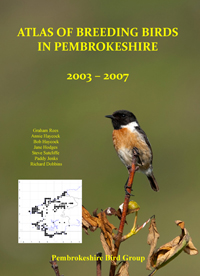West Angle Beach 20th to 25th August 2012
As I pulled into the car park at West Angle, I noticed a single small Dunlin-type wader in the middle of the beach. On checking the bird with my binoculars, the wader appeared to be very long-winged – with the wings extending well beyond the end of the tail. My initial instinct was that the bird was a Baird’s Sandpiper, but better views were required to rule out the possibility of a White-rumped Sandpiper. On this basis, I picked up my camera and tentatively approached the bird to get better views and hopefully a record pic of the bird. The tide was high at the time, so there was only a narrow band of sand at the top of the beach and the bird was looking a little uneasy due to the presence of several dog walkers. Although alone, with no birds present for size comparison, I had the impression that the bird was the size of a small Dunlin. The bill was black and slightly down-curved, and appeared somewhere between Little Stint and Dunlin in size.
Upperparts: Generally pale brown head and neck with fine dark streaking on crown. Dark lores, and pale creamy supercillia, on occasions looking very faint, meeting in front of eyes to form a pale patch above bill. Cheeks and ear coverts a pale but warm brown colour. Mantle feathers black with clean white borders; scapulars, lesser coverts, median coverts and greater coverts all with dark/black feather centres and primarily white (though sometimes chestnut) borders. Tertials and primaries black with thin white/chestnut borders, with primaries extending well beyond the end of the tail.
Seen in flight only once, when the wings showed only the faintest of wing-bars, and that appeared a slightly paler brown than the rest of the wing. No white rump was present, the rump and mantle appeared a uniformly brown colour when the bird was in flight. Tail was dark in the centre with paler edges.
Underparts: Throat white. Neatly demarcated pectoral band of dark chevrons on a pale buff/brown background. Otherwise, clean white lower breast, belly, flanks and undertail coverts.
Legs: short and black. Call: a short quiet trill that I heard as ‘prrrp’.
 Photo (c) Clive Hurford
Photo (c) Clive Hurford
Clive Hurford
Feb 2014
It stayed on the same beach until the 26th August and was seen by many observers
Graham Rees
 Monday, March 30, 2020 at 8:27AM
Monday, March 30, 2020 at 8:27AM  Pembrokeshire Avifauna committee | Comments Off |
Pembrokeshire Avifauna committee | Comments Off |  Wader,
Wader,  vagrant in
vagrant in  Baird's Sandpiper
Baird's Sandpiper 


